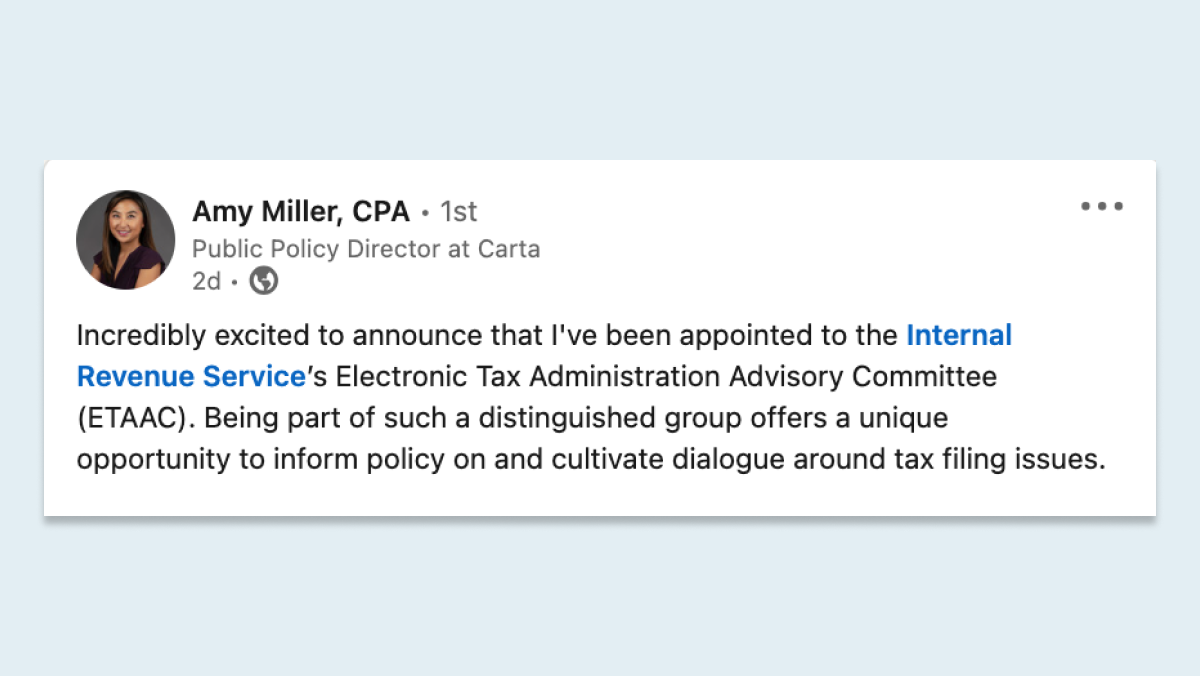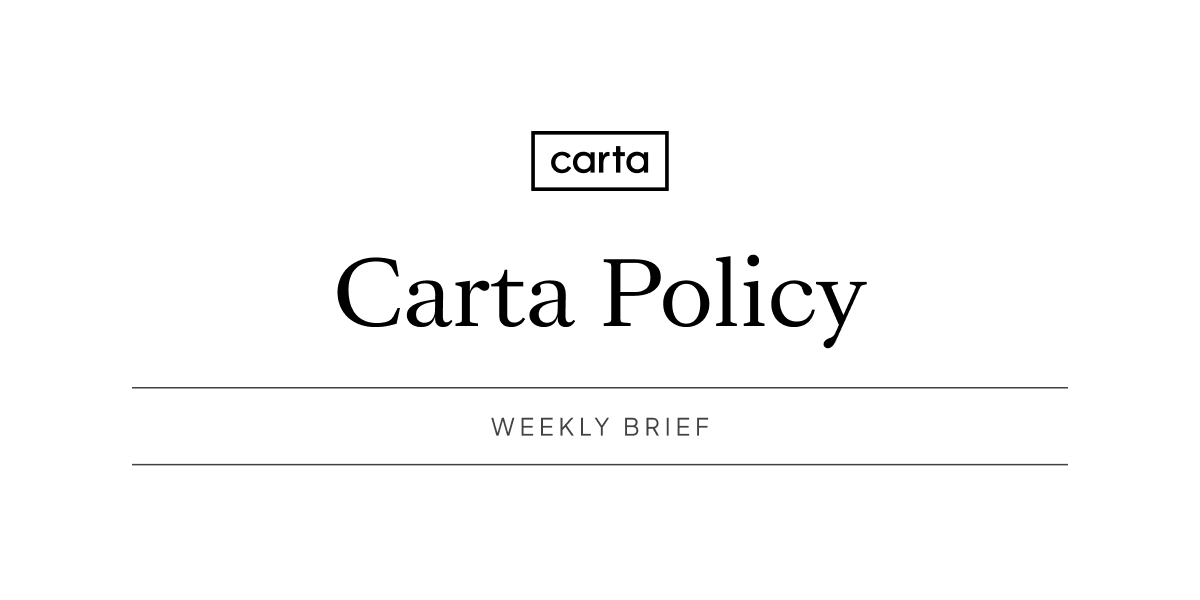Topline
-
Government shutdown almost certain as House Republicans unable to agree on plan
-
SEC continues to focus on private market regulation
-
IRS sharpens focus on high-income earners and larger partnerships
-
FinCEN releases CTA compliance guide as implementation date approaches
-
Carta’s Director of Public Policy, Amy Miller, appointed to IRS Committee
Shutdown Watch: T-8 Days
A government funding agreement is right where we left it this time last week: nowhere. The clock, however, keeps ticking, and it is very likely the existing funding expires September 30 without a new deal and the government shuts down, at least for a short time. This remains a dynamic situation with a few possible twists:
-
The week started optimistically with a deal between moderate leaders and conservative Freedom Caucus leaders. The deal, however, unraveled quickly as a handful of Republican hardliners refused to go along. House Republican leaders then explored multiple approaches, but everything has failed – including passage of a bill to fund the national defense.
-
Next week, Speaker McCarthy plans to call up the other non-defense-related individual spending bills, where Republicans will find it politically easier to cut funding. Lowering the spending levels may satisfy the right flank and gain their support bill by bill. This strategy only postpones the problem; it does not solve it.
-
The Senate will almost certainly reject anything that can pass the House and will likely counter with a proposal to fund the government at current levels and provide funding for Ukraine and disaster relief. McCarthy would then have to decide to put the Senate measure on the floor and surely risk his speakership.
The politics: Incentives are everything. And they are not aligned. President Biden and the Democrats want to fund the government, but on their terms. And they do not mind watching the Republicans participate in a circular firing squad. The five Republican hardliners want draconian spending cuts that cannot pass and it looks increasingly like they want McCarthy ousted. And McCarthy wants a deal because he knows a shutdown hurts Republicans politically, and, perhaps more importantly, he wants to stay Speaker. The venn diagram is, well, just three separate circles at this point.
SEC continues to focus on private market regulation
This week was a busy one for the SEC: the Small Business Capital Formation Advisory Committee (SBCFAC) and the Investor Advisory Committee (IAC) both met to discuss key topics impacting the the private market ecosystem:
-
Regulation D: The IAC met Thursday to discuss exempt offerings under Regulation D, the primary mechanism through which private companies and funds raise capital. The majority of the panelists embraced proposals to increase filing requirements and the amount of information disclosed for certain private companies using Reg D to raise capital, which is in line with changes Democratic SEC Commissioners have suggested.
-
Accredited investor definition: The IAC also discussed updating “accredited investor” qualifications, largely focused on raising the wealth and income thresholds to qualify, requiring periodic reviews, and barring retirement savings from being placed in non-registered investments.
-
Funding for early-stage companies: The SBCFAC met to discuss ways to encourage increasing diversity and investing in early-stage companies. Trends show that diversity is increasing in the venture capital space, but Commissioner Hester Peirce cautioned that regulation like the recently adopted private fund adviser rules would have a disproportionate impact on smaller advisers and create barriers to entry that will inhibit competition and foster consolidation. Members of Congress raised similar concerns around the potential impact of the private fund adviser rules on diverse fund managers and the entrepreneurs they support when the SEC’s Investment Management Division Director testified before the House Financial Services Committee (HFSC).
Why it matters: The SEC will continue to focus on private markets and is expected to consider reforms to Regulation D that will increase burdens on private issuers raising capital and increase the financial thresholds for investors to qualify as accredited. While IAC recommendations are not binding, they can be persuasive and bolster expected efforts from the Commission to impose additional conditions and require more disclosure for companies seeking to raise capital under Regulation D. SEC Chair Gensler will likely be pushed on these issues when he testifies before the House next week.
Carta’s Director of Public Policy, Amy Miller, appointed to IRS Committee
Carta is excited to announce that Amy Miller, CPA, Director of Public Policy, has been appointed to the IRS Electronic Tax Administration Advisory Committee (ETAAC) where she will have the opportunity to help shape tax policy. Congress established the ETAAC to provide a public forum to discuss electronic tax administration issues. Learn more about the appointment here.

IRS sharpens focus on high-income earners and larger partnerships
As part of a rebalance effort, IRS Commissioner Daniel Werfel announced a shift in enforcement focus and resources from low to high-income taxpayers.
-
The agency moves ahead with its Strategic Operating Plan to use Inflation Reduction Act funding to expand exam coverage of large partnerships and high-income earners— establishing a new work unit within the Large Business and International (LB&I) division.
-
The IRS also announced that it will hire 3,700 new employees to assist with complex partnership audits. The hiring is specifically targeted for higher-skilled and higher-graded ( GS-13) revenue agents.
Why it matters: For years, SFC Chair Wyden and other Democrats have questioned why the IRS audited low-income taxpayers at a significantly higher rate than wealthy earners, which is likely the result of a historical lack in IRS funding that is required to conduct complex and larger-scale audit projects. The IRS now has the resources to do so.
FinCEN releases CTA compliance guide as implementation date approaches
This week, the U.S. Department of Treasury’s Financial Crimes Enforcement Network (FinCEN) released a Small Entity Compliance Guide to assist small businesses to comply with the new beneficial ownership information (BOI) reporting requirements. Starting in 2024, millions of entities registered to do business in the U.S. will be required to report to FinCEN information about their beneficial owners—the individuals who ultimately own or control a company.
-
FinCEN’s latest guide includes clarified guidance and provides examples to help companies identify their beneficial owners that will be required to report information through a new electronic filing system.
-
On Wednesday, the HFSC advanced several national security-focused bills, including the bipartisan Protect Small Business and Prevent Illicit Financial Activity Act, which proposes to delay the Corporate Transparency Act’s (CTA) January 1st implementation date, extend the filing deadline for updating BOI for registered small businesses to 90 days, and eliminate a loophole that would possibly allow a reporting company to submit alternative identification. This bill will not become law, but continues to pressure FinCEN on delay as the deadline approaches.
Why it matters: The CTA has been the subject of bipartisan scrutiny because of its fast-approaching implementation date and lack of clarity and guidance on the filing process. Carta and 19 co-signatories are urging FinCEN to include methods for small businesses and other covered entities to easily submit required information for BOI reporting, which remains set to begin on January 1, 2024.
New: Carta State of Startup Compensation Report
This week Carta published our semiannual State of Startup Compensation report. In the new report, Carta’s Head of Insights discusses the effects the chill in startup fundraising is having on startup employee compensation.

News to know
-
Senators reach agreement on SAFE banking. Lawmakers in the Senate have reached an agreement on the SAFE banking bill, which would make it easier for banks to offer services to legal marijuana businesses, ahead of a planned markup on the legislation next week.
-
SEC fines Lyft $10M for failing to disclose board member’s financial interest in private shareholder’s pre-IPO stock transaction. Prior to its public listing in March 2019, a Lyft board director arranged for the sale of private shares through an affiliated SPV, which the SEC alleged Lyft should have disclosed because the company approved the transaction.
-
SEC crypto enforcement chief outlines next possible areas of SEC crypto focus. David Hirsch, chief of the SEC Crypto Assets and Cyber Unit, discussed SEC enforcement actions against crypto exchanges, NFT issuers, and issued a warning to institutional investors who are acting as statutory underwriters, signaling potential future enforcement actions.
-
SEC adopts funds names rule. In an effort to crack down on “greenwashing,” the rule will require investment companies and business development companies with a particular focus to ensure 80% of the fund’s portfolio matches the asset advertised in its name. The SEC is expected to adopt additional ESG rules for private funds in the near term.
-
FTC suit sends signal to private investors in health care. The Federal Trade Commission sued U.S. Anesthesia Partners, one of the largest anesthesiology providers in the country, and its private equity backer, alleging the pair conspired to illegally monopolize the anesthesiology market in Texas and raise prices at the expense of patients, according to a statement Thursday from the agency.
Upcoming events
-
Carta Policy Weekly Live - Weekly at 9:00 a.m. PT / 12:00 p.m. ET
-
House Financial Services Committee hearing: Oversight of the Securities and Exchange Commission - September 27 at 7:00 a.m. PT / 10:00 a.m. ET
-
Brookings Institution: A conversation with FTC Chair Lina Khan and DOJ Assistant Attorney General Jonathan Kanter on antitrust enforcement - October 5 at 7:00 a.m. PT / 10:00 a.m. ET
-
Carta event: Unlocking Liquidity for Employees in APAC: The Endowus Story - October 10 at 8:00 p.m. PT / 11:00 p.m. ET

